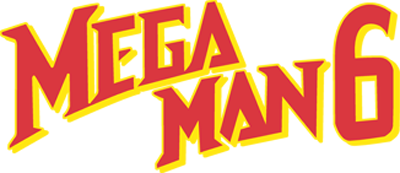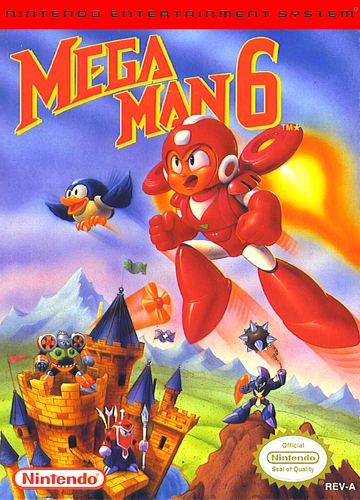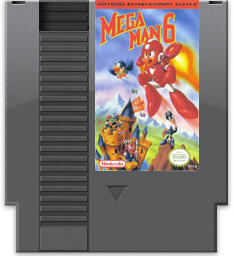

Mega Man 6, developed and published by Capcom, is the sixth installment in the iconic Mega Man series. Released in 1993 for the Nintendo Entertainment System (NES), this game continues the legacy of the Blue Bomber, offering thrilling platforming action, challenging bosses, and the familiar gameplay mechanics that fans have come to love. With its refined visuals, improved controls, and a few new twists, Mega Man 6 successfully delivers an enjoyable experience for both longtime fans and newcomers to the series.
Year: 1993
Manufacturer: Capcom
Genre: Platform
Rating: HSRS - GA (General Audience)
Gameplay:
The core gameplay of Mega Man 6 remains faithful to its predecessors, as players guide Mega Man through a series of side-scrolling levels filled with enemies, obstacles, and perilous jumps. The game's level design is top-notch, featuring a variety of themes, from futuristic cities to treacherous forests, each with its own unique challenges and enemies. The platforming mechanics are tight and responsive, allowing for precise movement and precise jumps.
As in previous Mega Man titles, defeating the game's eight Robot Masters grants Mega Man their unique powers, known as "Robot Master Weapons." Experimenting with these weapons and discovering their strengths and weaknesses adds a layer of strategy to the gameplay. Additionally, Mega Man's trusty Mega Buster is still available as a reliable default weapon.
One notable addition in Mega Man 6 is the "Rush Adapter," an upgrade that allows Mega Man to transform into the powerful "Jet Mega Man" and "Power Mega Man." These transformations provide new abilities, such as flight and enhanced firepower, which add a fresh twist to the gameplay and open up new possibilities for exploration.
Graphics and Sound:
Visually, Mega Man 6 showcases the NES's capabilities with vibrant and detailed sprites, along with colorful backgrounds that bring each level to life. The game features a diverse range of enemy designs and bosses, each with their own distinctive appearance and attack patterns. The graphical fidelity and attention to detail are impressive for an 8-bit game, immersing players in a visually appealing world.
The soundtrack of Mega Man 6 maintains the series' tradition of outstanding music. The compositions are catchy, energetic, and perfectly capture the atmosphere of each stage. From the iconic boss themes to the memorable tunes of the stages, the game's soundtrack elevates the overall experience and contributes to the game's longevity.
Replay Value:
Mega Man 6 offers a solid amount of replay value, thanks to its challenging difficulty and multiple paths to explore. The game's eight Robot Masters can be tackled in any order, allowing players to devise their own strategies and experiment with different weapons. Additionally, uncovering hidden collectibles, such as energy tanks and extra lives, adds an extra layer of depth and encourages exploration.

Conclusion:
Mega Man 6 is a worthy addition to the beloved Mega Man series, delivering the classic platforming experience fans adore. With its refined gameplay mechanics, engaging level design, and memorable boss battles, the game continues to showcase the excellence that defines the franchise. Whether you're a fan of the series or a newcomer to Mega Man, this installment offers an exciting and challenging adventure that will keep you hooked from start to finish. Strap on your Mega Buster and get ready to blast your way through another thrilling adventure with Mega Man 6.
Explore in-depth reviews and analyses of classic Nintendo Entertainment System (NES) games, including gameplay mechanics, graphics, sound, and overall nostalgic experience.